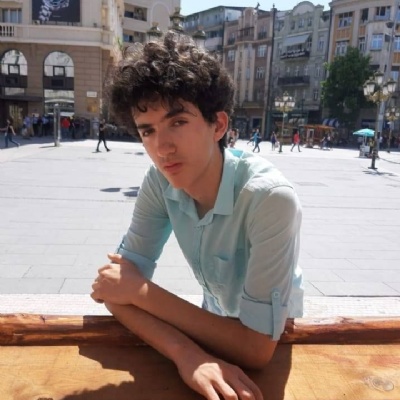
Artan Kadriu
Curiosity
At the beginning of the summer of 2020, Bobo Stankovikj, one of the national committee members, sat down for a casual chat with each of our new students. We hope these profiles help you get to know them!
Filter

Curiosity

Curiosity
Curiosity
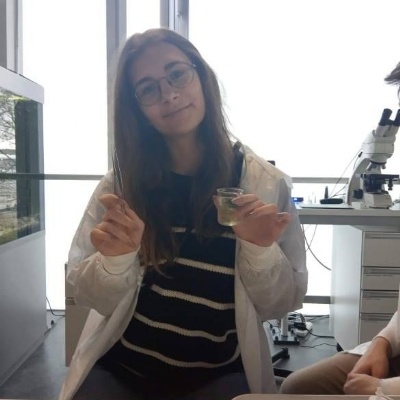
Communication

Communication
Marija believes in the power of communication.
“It’s not about how many big words you use, or how long your sentence is,” says Marija, in her typically analytical way. Last year, her team won the national debate championship, but she didn’t stop there. She went on to compete again this year, and on June 18th, Marija was named the country’s best high school speaker.
Growing up, the 17-year-old debater wanted to get involved in the community, but unfortunately, sometimes the context didn’t allow her to. “It frustrated me to see that you had to be 18, or in high school — I thought to myself “How come I can’t do this?” Her community involvement has continued all throughout high school: “That’s how I began to form my own opinions and develop as a person.” Due to the experiences she’s had, Maria is a fantastic conversationalist: we talked about topics ranging from the Icelandic epic that she’s currently reading, to the benefits of practicing yoga.
This year, Marija was an assistant-instructor in the Youth Educational Forum (YEF), and she wants to continue doing something similar at UWC Red Cross Nordic. “When I do something, I do it because I enjoy it… Every extracurricular activity I’ve been committed to was because I liked it and it was something I wanted for myself.” Although debate is the reason why she joined YEF, the like-minded people there are the reason she stayed.
For Marija, there’s a huge difference between thoughts and how you communicate them. That’s why she admires musicians and authors who easily express their thoughts. The rapper Kendrick Lamar, for example, “knows how to get his point across in his chill songs without making you feel attacked.” In a discussion about To Kill a Mockingbird she told me “many people have the right ideas. But the true skill lies in how you express them. I might share Harper Lee’s opinions, but I wouldn’t know how to formulate it. It’s such a beautiful skill — to express a thought and have other people understand it.” Of course, Marija humbly refrained from mentioning that she herself can skillfully communicate, even as the debate judges evidently realized that pretty quickly.
The Norweigan embassy still hasn’t started issuing visas, so Marija isn’t sure when she’ll exactly be able to get to her college. She’s already considered several alternatives. “I always want to have different options. I’m not the type of person who’s bound to a routine, which is why I prefer to have many back-up plans instead of one. She’s already decided on the subjects she’s taking: Global Politics, History and English Literature on a higher level. “I know it won’t be easy, but, in a way, everything is a challenge. I can’t avoid difficult subjects… I wouldn’t want to have my options limited just because I was too lazy to study a bit more.”
Marija isn’t sure about what she’ll do in the future, but whatever it is, she’s sure that it’s going to involve helping people. “I need to know that what I’m doing is, in a way, useful. I don’t want to work just so that I can pay my bills. At the end of the day, I want to feel like I have the power to make a difference. I want to know I’ve done something that impacts other people positively. ”
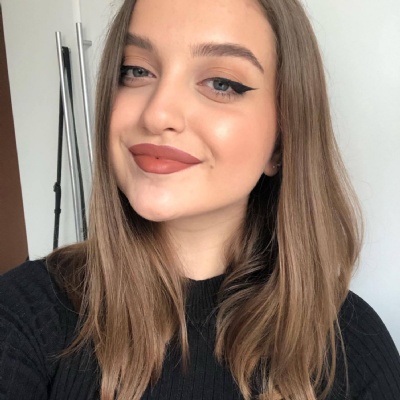
Introspection

Introspection
Vesna is introspective.
Having grown up in Valandovo with two sisters, Vesna had a lot of time to think. “I think that when people hear ‘Valandovo,’ they think of a city, but it’s really more of a rural environment. We do have a boulevard, but carriages dragged by four-legged animals use this boulevard every day.” A few years ago, her sisters found some helpless kittens on their street. “We had to take care of them, but my sisters went abroad and the kittens stayed with me. I learned about feeding and care because of them.” In this context, Vesna developed a sense of empathy which extends beyond animals.
“The one thing that I know won’t change is that humanitarian work will be a part of what I’ll do. Helping people, animals — that’s what I’m interested in.” The seventeen year old high schooler has thought deeply about her role within the community. Even though she humbly mentioned that she doesn’t know how she’ll fit in at the College in Mostar, Vesna knows that she’ll use the opportunity to contribute to the place where she grew up. “I intend to go back home. If everyone is just thinking about going to a ‘better place’ and not helping improve things in the place where they came from, there’s really no point. My goal is to educate myself better, and to go back to the community where I grew up. I definitely intend to live here.”
The connection with the environment around her is a trait that comes out of her family context. Already at a young age, Vesna began to appreciate art. She plays the guitar and sings. She’s also interested in photography and painting, because her father and grandfather enjoyed painting themselves. “It wasn’t imposed on me, it was just an art form that was available, one that I could see… It became sort of a hobby to take photos of landscapes and paint them as realistically as I could. ” Because of this, Vesna will take visual arts along with politics and English in Mostar.
Vesna is uniquely introspective. She says that she has one flaw: “I’m not particularly open to talking to people about myself until they ask me something.” Still, she openly talked about her upcoming transition to Mostar (“even though I believe that I am well organised, I think that all of that will change as soon as I get there”), about her relationship with her sisters (“without them, I would not be the person that I am today”), and about her tendency to underestimate herself (“I’ve missed out on things that could’ve become a part of my life just because I thought that I wouldn’t make it.”)
We spent much of the conversation talking about animal cruelty. Vesna easily argued against animal testing (she mentioned that she had started developing her arguments while trying to convince her sisters) and she often goes back to her basic motivation: a clear moral compass. Vesna cares about animals, as well as about her community, “because they’re living things! It’s very simple.”
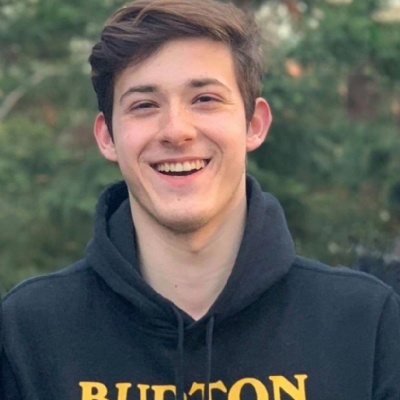
Motivation

Motivation
Mateja is motivated.
“I started swimming because I wasn’t good at any sports that involved balls,” jokes 17-year-old Mateja, a member of the national swimming team. He’s been swimming for as long as he can remember, and he’s been successful in all swimming categories in many national and international competitions.
The competitive spirit of swimming has shaped him as a person. “I used to get very angry when I’d lose a race. I had a rival my age who I had been swimming with since the age of five. I’d get annoyed whenever he’d win and I’d make sure to beat him in the next race, but then he’d also get back at me, and that would just go on forever. Neither of us would ever give up.”
Even though he plans on dedicating most of his time to studying and making new friends at UWC Thailand, Mateja doesn’t want to give up swimming. The values of teamwork and self-discipline he developed through swimming have influenced other aspects of his life, especially his eagerness for new experiences and challenges. Mateja’s very excited to be part of UWC Thailand’s diverse student body. “A member of the National Committee introduced me to his friend from Thailand, who in turn introduced me to a guy from Spain. The Spaniard then connected me with 30 other students. All of them were way more supportive than I expected them to be. Always happy to help! We hit it off immediately.”
In Thailand, Mateja decided to take subjects like Economics, Business and Design Technology, which will help him with his future career in the international business sector. “Business can help you climb a few steps up the social ladder, but there’s always the risk of falling. However, I think that with perseverance, desire and ambition, you can help develop even the smallest businesses and improve the standard of living.”
Mateja thinks that it’s a great opportunity for private companies to be actively involved in helping the community. “It wouldn’t cost big corporations much to help the community. If, for example, a car company had a specific discount for low-income people to help them afford a car, that wouldn’t make much of a difference for the company’s profits, but it would make a world of difference for many members of the community.”
The new college is, of course, quite a long way from home. Mateja introspectively talks about how living in Skopje influenced him: “It built my character, it helped me feel confident and independent enough to go to a place like Thailand.” He’s a bit sad to leave his highschool friends from “Georgi Dimitrov”, but he’s sure that they’ll stay in touch. Some of them have already made plans to visit him in his new school!
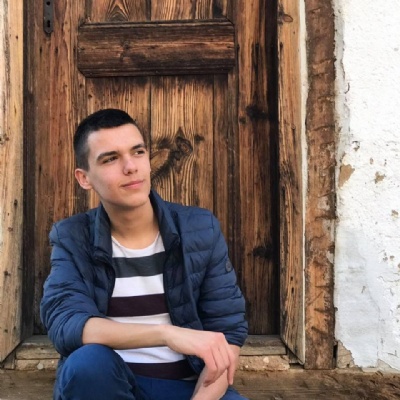
Enthusiasm

Enthusiasm
Filip is full of enthusiasm.
When I asked him about his future high school — UWC Maastricht, the Netherlands — his eyes opened wide. During the last interview of the selection process, candidates tend to have a good idea of which College they want to go to. They usually know whether the College is in an urban or rural environment and which courses they want to take. Filip’s enthusiasm was different. He already knew that he wanted to go to Maastricht specifically, mentioning the community-outreach extracurriculars (Filip has worked with the Red Cross), the project weeks focused on social entrepreneurship, and the various conferences organised by the College students.
He isn’t passionate only about UWC. Filip is wholeheartedly engaged in Smojmirovo, a village near Berovo, where he grew up. He describes Smojmirovo as a “very, very, very, very small place”, where “everyone knows everyone else”. But, that didn’t stop him from actively participating in science competitions. Even when adults around him weren’t supportive — it had happened that he would be told “don’t study so much, go outside and rest a bit” — Filip continued to maintain his drive. Already in the sixth grade he made it to a state competition in biology, starting his long relationship with the natural sciences.
“I’m absolutely fascinated by how the human body works.” His experience with natural sciences motivates Filip to study medicine in the future. Again, with a voice full of joy, he told me how he’s already preparing for his new academic curriculum. He is practicing German, and if he could have, he would have taken four (instead of three) higher level subjects: chemistry, biology, English and German. While we were talking, Filip easily slipped in ideas and individuals that he’d read about. For instance, he told me about John Adler, a neurosurgeon at Stanford University, as an example of a possible roadmap for his own future.
Like any high schooler, Filip sometimes isn’t sure. “I don’t know who I’ll hang out with and I don’t know who I’ll meet — we all have these fears.” But, the way in which he opened up about his insecurities and the many plans he’s already made are both signs that his experience at UWC Maastricht will be one of growth. That kind of growth is necessary, he told me, to improve the local community. “If you want to improve the situation around you, you need to go out, learn, go back, and apply what you have learned.”
At the end of our conversation, I asked him if I had missed anything. Entirely within character, Filip immediately had an answer: “I like psychology and murders… No, no, I don’t like murders! I’m interested in the psychology of killers — I am surprised by how a person can consciously hurt someone else without feeling bad.”
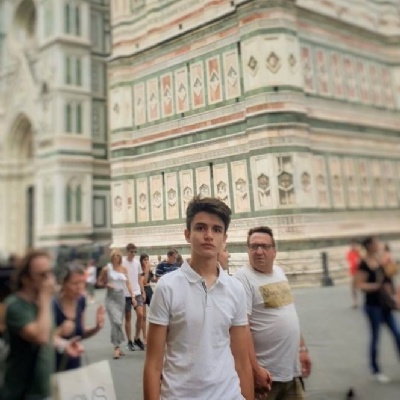
Thoughtfulness

Thoughtfulness
Damjan’s ideas are well thought out.
Before answering, Damjan takes a short break to think. He grew up in Kumanovo, which he told me was a big part of his identity. When the UWC application asked him which languages he spoke, Damjan answered “Macedonian (Kumanovo dialect)”. His thinking is logical when he explains the linguistic differences between literary Macedonian and the conversational Kumanovo dialect, which has retained some of the cases that can be found in the south of Serbia.
“Observing such differences makes everyday things important. Is there anything more everyday-like than the way someone speaks?” The fact that Damjan really pays attention to the world around him is not only obvious when it comes to linguistics. On almost every question, he gave several alternatives. For instance, he knows that he will choose math and physics at a higher level in UWC Adriatic. However, when he was telling me about social science options, Damjan pointed out a list of benefits for each of them. The same thing happened in the conversation about extracurricular activities: kayaking, sailing, hiking, and Model United Nations were all on the list of opportunities. He will wait until he gets to UWC before making a final decision.
After studying in Italy, Damjan finds himself in the United States. Or in Europe. Or in Kumanovo. There are good sides to most options. And modestly, Damjan says, “I keep telling you ‘I don’t know’”. To keep his unique mindset, Damjan is actively looking for new ideas. He had just read The Great Gatsby and watched a movie about the Vietnam War (which impressed him for the way the main character’s development was portrayed).
Damjan reads “literally everything” on the Internet. “Sometimes I’ll just get lost,” he told me as he explained an article he had read about music theory, which sounded interesting even though he couldn’t fully understand it. In that way, he complements the education he has so far received at the American High School in Skopje. The openness to new ideas makes him more prepared for the upcoming experience in Duino, and that’s why he has already met some of his future classmates. “Very cool characters. In every way, there is someone who stands out.” He wants to share with them the aspects of his country that are most interesting to him, such as the demographic mix, cultural customs, or the interesting language.
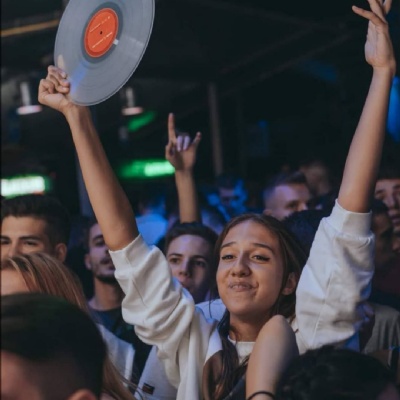
Lightheartedness

Lightheartedness
Mila is seemingly care-free.
She starts almost every story with “do you want to hear something funny?” The 17-year-old high school students knows how to use her positivity to turn those first introductions — when conversation doesn’t come as easily — particularly easy. In our interview, she broke the ice when, laughing, she “bragged” that she had fallen off her bike the previous day, even offering to show me the bruise.
Mila approaches many of her adventures with similar ease. Though she hasn’t entirely decided which subjects she will take at UWC Mahindra in India, she listed several paths towards a career she might like. “The weirdest scenario includes chemistry and biology, so I can become a zoologist, because I like animals… There was a scenario where I become a computer scientist, but I was reminded I’m not very good at math.” Mila spent three years at “Vasil Antevski – Dren,” so it’s also possible that she continues to study social sciences and pursue an interest in law. I asked her how she plans to decide. She said, “I tell myself that I’ll see what each day tells me. And every day, it’s the same — the day tells me absolutely nothing. I don’t know what I was expecting.”
Her positivity is especially helpful when she needs to be dedicated towards a single goal. Mila, as a member of the Macedonian national volleyball team, tirelessly trains to improve. Trainings — before they were halted because of the virus — happened every day, and Mila had to learn to balance school and sports so she can maintain the high level of play. But she’s also involved in non-governmental organizations: with another UWC student, she moderated a discussion about theater at the recent Equalis-fest.
India’s borders are still closed and, while she’s waiting to hear from the embassy, Mila is finding ways to fill up her free time. She just finished “Lolita” by Vladimir Nabokov, and just began “Sapiens” by Yuval Noah Harari. She had read negative reviews for the latter book, but still decided to give it a chance (“I’ve always been good-hearted,” she joked). When allowed, she tries to continue volleyball practice, and when not, she watches movies. Mila mentioned that she’s interested in psychological thrillers that leave her mind-blown for days afterwards.
Her positivity, which was obvious throughout our conversation, helps her get through the uncertainty about her arrival to India. She told me herself: “I used to get worried and anxious about India, about which subjects I’ll take — but then I told myself, ‘Mila, wait. You’re going to India to study for months at a time. Why not relax a little now?’”